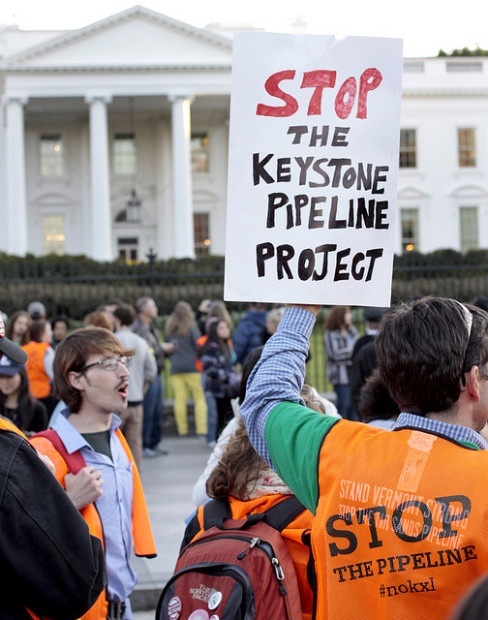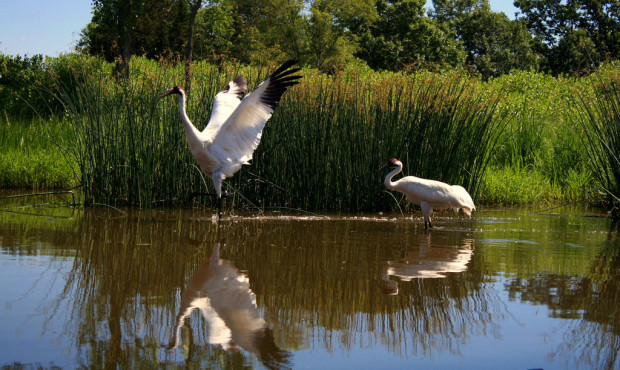We have much more to do and your continued support is needed now more than ever.
Keystone XL Loses Ground in Congress
Once again, the little campaign that could has defied long odds and demonstrated that facts keep getting in the way of the Keystone XL pipeline. Emboldened by hopes of delivering a victory for the fossil fuel industry, which has poured tens of millions of dollars in the coffers of House members, Rep. Lee Terry (R-NE) again pushed a bill to bulldoze fundamental environmental reviews, and force through the “all risk, no reward” Keystone XL tar sands pipeline. However, this attempt to shut down the review process, ignore public comments, override protections for clean air and water, and force approval of the dirty project proved far weaker than Rep. Terry expected. Last night’s vote showed that 19 House members have changed their minds and decided that maybe the American people are justified in wanting a meaningful review of this environmental boondoggle.

Growing Momentum Against Keystone XL
While Rep. Terry’s measure (H.R. 3, the “Northern Route Approval Act”) passed as expected, this vote was yet another sign that momentum is growing to reject dirty tar sands, protect our communities from disastrous spills, and turn towards cleaner, renewable energy choices. And despite all the theatrics in Congress, the ball remains in President Obama’s court—where it belongs. Both the facts and the political winds support doing the right thing by saying NO to an unneeded tar sands export pipeline that would put our heartland at risk for spills and send us in the wrong direction on curbing carbon pollution.
Just last month, more than 1 million comments from Americans requested that the State Department reject Keystone XL. Given the anti-environmental makeup of this Congress, the Terry bill was expected to pass by a wide margin, but numbers like these obviously made lawmakers take note. As NWF president and CEO Larry Schweiger said about the KXL pipeline:
It’s the wrong approach to put a foreign energy company ahead of more than 1 million Americans who have expressed concern for our nation’s wildlife, energy security and public health.
Indeed it is. The risks of Keystone XL are huge; the reward is 35 permanent jobs in exchange for higher gas prices, oiled wildlife and communities, and another step towards climate calamity.
The Tar Sands Industry’s Plans for Your Backyard
The Great Plains aren’t the only region threatened by reckless tar sands pipeline expansion:
- In 2010, an Enbridge, Inc. pipeline ruptured in Michigan, spilling a million gallons of tar sands oil into the Kalamazoo River. Three years and close to $1 billion later, the cleanup continues. Enbridge is laying the groundwork for pipeline expansions that would dwarf Keystone XL and put the Great Lakes watershed in danger of another spill. We need to say no to this proposal as well.
- Exxon’s Pegasus pipeline, reversed to carry tar sands oil, spilled into an Arkansas neighborhood in March, forcing dozens from their homes and oiling hundreds of animals including birds and turtles.
- Now, Exxon and Enbridge want to reverse a pipeline through Vermont, New Hampshire and Maine to carry tar sands oil to the international market. The entire New England delegation voted against Rep. Terry’s Big Oil giveaway bill, and the message from New England is clear: it wants a clean energy future, not oil spills.

And this doesn’t even begin to get at the Florida-sized area in Alberta being mined and leveled to extract this dirty fuel. Habitat for iconic wildlife—like Woodland Caribou, Gray Wolves, Black Bears, and 190 migratory bird species including the endangered Whooping Crane—is being destroyed, putting these species in peril, polluting rivers, and endangering the health of indigenous communities.
The message that tar sands is a bad deal is getting through.
More and more Americans are coming around to the fact that Keystone XL, while a great deal for foreign oil companies, is bad news for the rest of us. As Elizabeth Kolbert put it in an important new article in The New Yorker:
Once Keystone is built, there will be no putting the tar back in the sands. The pipeline isn’t inevitable, and it shouldn’t be treated as such. It’s just another step on the march to disaster.
It’s past time for Pres. Obama and Secretary of State John Kerry to look at the facts. We don’t need tar sands oil. We don’t need more spills. And we can’t afford to doom our children to the carbon pollution from increased tar sands expansion. People are starting to get it. It’s time for the President to match his words on climate with deeds. Saying no to Keystone XL is a good place to start, and the time to start is now.
![]() Every voice counts! Tell President Obama to reject the climate-destroying Keystone XL pipeline.
Every voice counts! Tell President Obama to reject the climate-destroying Keystone XL pipeline.




















